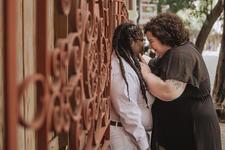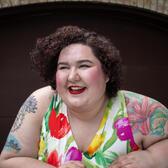Reframing Rosh Hashanah
It’s nippy outside, the wind is picking up, and the pumpkin spice latte has reappeared on Starbucks menus. It's like the world is screaming to me that it's almost Rosh Hashanah, the Jewish New Year.
Rosh Hashanah in the Hasidic home I grew up in left me with duffle bags full of memories: my mother, standing in the kitchen, preparing round challahs, making soup, and, some years, if we got really lucky, even preparing a whole salmon. The New Year always arrived with the bite of cold air, but inside my home, life was bustling with the beginning of the holiday season. Now, when I look back, I try to tune out any bitter or painful thoughts that come quickly to mind along with the warm fuzzy holiday memories.
There were honey chicken wings, the only meat we could afford most years to feed the lot of us. As the oldest of fifteen children, I remember how every Rosh Hashanah seemed to be accompanied by a new baby. So much of this holiday was threaded with symbolism: No garlic. No nuts. No spicy food. Round challahs. It was as if the food we ate could influence the very outcome of the next year.
We'd walk miles to bring the sound of the shofar to elderly Jewish refugees from Eastern Europe. The sound would pierce the air and starkly remind us that this was an opportunity to shape our destinies, or that year at the very least. Sharing the beauty and blessings of the holiday was integral to my family's faith and how we practiced Judaism.
It was on Rosh Hashanah when I was sixteen years old that my life changed forever. Instead of coming home to cook with my mother, I stayed in my boarding school’s dorm in Chicago, determined that I wouldn't go through the other part of the holidays that I dreaded: the screaming, the crying, the silence I was required to uphold. When I didn’t behave, my father's idea of punishment wasn’t cooking or cleaning the home. Instead, I was made to sit alone, clean the synagogue, or memorize Tanya, the sacred Hasidic text. It meant I couldn't help my mother prepare, the burden was left entirely on her shoulders.
My mother was, and still is, one of the strongest people I know. But people wonder how I can describe her this way. The horror and pain I went through? I know my mother went through worse at his hand, and yet still managed to parent me and my siblings in a way that made us better people. My mother taught me some of my greatest lessons: there is always room at the dinner table and life is what you make of it. More importantly, she passed on her core belief in Hashgacha Pratis, divine providence: Everything in this world happens for a reason.
That was the Rosh Hashanah that led to my entering foster care and life as I now know it. Foster care was a way of saving myself from all those bitter things I try to forget, but most importantly it was a way to shine a blinding light onto my parents' home. While most of my other siblings were never placed into the system, my father could no longer reign free.
Years have passed since that fateful Rosh Hashanah. I haven't been home, and haven't truly spoken to my mother since. When the air gets a little cold and September rolls in, I can't help but miss the good moments: the food, the love, the chill in the air as we raced against the setting sun to make it home before the holiday began, sharing a bond only a firstborn daughter and her mother can understand.
Soon, it will be Yom Kippur, the holiest day of the Jewish year. I'll lay in bed and talk to my partner about my mother. When I lived at home, I would get my blessing before the sun went down, the blessing that would inspire and uplift my entire year. This was the traditional blessing that many families bless their daughters with weekly, but in our home we received it once a year before the start of Yom Kippur.
“Ye'varech'echa Adonoy ve-yish'merecha. Ya'eir Adonoy panav eilecha viy-chuneka. Yisa Adonoy panav eilecha, ve-yaseim lecha shalom.”
“May G-d bless you and watch over you. May G-d turn His face toward you and shine upon you and show you favor. May G-d be favorably disposed toward you, and may He grant you and us peace.”
I'll lay there and wonder if maybe I made the wrong decision, as if a sixteen-year-old girl should have to choose between her mother and her life... between the love only a mother can give and an escape from horror and pain.

Chaya Milchtein and her fiancée. Photo by Carlos Ratti.
This year, I will spend Rosh Hashanah engaged to a woman who inspires me, takes care of me, and never fails to grip me tight as I continue to cry for my mother. We got engaged on a chilly Saturday evening in late August, by a lake, quietly and without fanfare. Neither of us called our mothers. I spent the next day feeling broken, like I had to experience the loss of her again, all over again.
One of these days, my fiancée will come home to find me making challahs, soup, and honey chicken. She'll come over and give me a hug, knowing and understanding my grief. The year will go on, and the next holiday I'll cook something new, knowing that this way my mother will still be a part of my life, as if, by sharing my mother’s food with my partner, I’m sharing my partner with my mother.
May this year be one of healing, love, and new relationships. May G-d grant us a year of sweetness, happy surprises, and of course good health.








Thank you for this. I will keep it with me through the chagim.
A wonderful piece about a world I am totally unfamiliar with. Thanks for sharing.
beautiful piece. Thank you!
Beautifully written and very moving. Wishing healing for all.
This made me cry. Beautifully written. Shana tova!
You were so strong back then - and now you are an inspiration. (I, too, had to break from my mother, and I've learned since then that I'm far from alone in having had to make that choice. Blessings.)
Glad something positive is finally written about this woman on the internet!
Need to heal this Rosh Hashana from a lot of pain